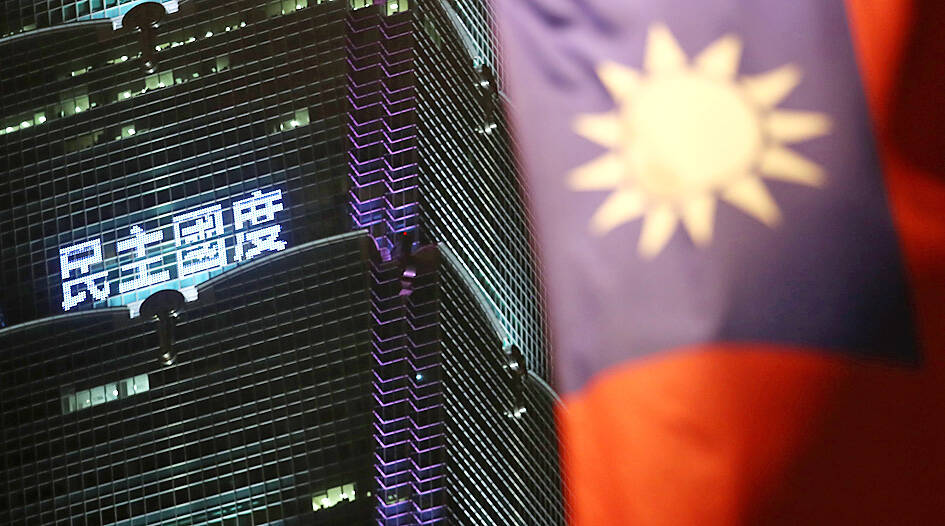Taiwan remained top in Asia and 10th globally among the 167 countries and territories ranked in the Democracy Index 2023, which was released on Thursday by the London-based Economist Intelligence Unit (EIU).
However, Taiwan’s score of 8.92 out of 10 was slightly lower than the 8.99 it was awarded in 2022, the EIU’s Democracy Index 2023: Age of Conflict report showed.
In Asia, Taiwan led regional partners South Korea and Japan, ranked 16th and 22nd respectively, the report said.

Photo: CNA
In 2021, the EIU ranked Taiwan as the eighth-strongest democracy in the world and the strongest in Asia with a score of 8.99.
Norway retained its position as the most democratic country in Thursday’s report, a spot it has held for 14 years, followed by New Zealand and Iceland.
The other countries in the top 10 are Sweden, Finland, Denmark, Ireland, Switzerland and the Netherlands, while China and Uzbekistan were tied for 148th.
The EIU is an economics consultancy associated with The Economist magazine that provides forecasting and advisory services.
The Economist on Wednesday said in a report on the rankings that “this year should be a triumphant one for democracy.”
“More people are expected to vote in national elections in 2024 than ever before, but many elections will be problematic,” it said.
This year’s index showed that “only 43 of the more than 70 elections are expected to be fully free and fair,” it added.
The index ranks countries and territories based on 60 indicators in five categories: electoral process and pluralism, functioning of government, political participation, political culture and civil liberties.
Based on the indicators, each area is given an overall score from zero to 10, and is classified as either a “full democracy,” “flawed democracy,” “hybrid regime” or “authoritarian regime.”
Last year was “an inauspicious year for democracy” with the average global index score falling to its lowest level of 5.23 since the index began in 2006, the EIU reports said.
In 2022, the score was 5.29, it said.
“The increasing incidence of violent conflict has badly dented the global democracy score and prevented a recovery after the pandemic years of 2020-[20]22,” it said.
Less than 8 percent of the world’s population live in a full democracy, while up to 39.4 percent live under authoritarian rule, up from 36.9 percent in the 2022 report, the EIU said.
Western Europe was the only climber in Thursday’s index, with 15 out of 24 “full democracies” globally in the region, it said.
Canada was the only “full democracy” in North America, with the US classified as a “flawed democracy” since 2016, it said.
In Asia and Australasia, Taiwan, Australia, Japan, New Zealand and South Korea are listed as “full democracies,” it said.
Asia’s overall score dropped from 5.46 in 2022 to 5.41 last year, the lowest since 2006, the EIU report said.

Taiwan has received more than US$70 million in royalties as of the end of last year from developing the F-16V jet as countries worldwide purchase or upgrade to this popular model, government and military officials said on Saturday. Taiwan funded the development of the F-16V jet and ended up the sole investor as other countries withdrew from the program. Now the F-16V is increasingly popular and countries must pay Taiwan a percentage in royalties when they purchase new F-16V aircraft or upgrade older F-16 models. The next five years are expected to be the peak for these royalties, with Taiwan potentially earning

POSITIVE DEVELOPMENT: Japan and the US are expected to hold in-depth discussions on Taiwan-related issues during the meeting next month, Japanese sources said The holding of a Japan-US leaders’ meeting ahead of US President Donald Trump’s visit to China is positive news for Taiwan, former Japan-Taiwan Exchange Association representative Hiroyasu Izumi said yesterday. After the Liberal Democratic Party’s landslide victory in Japan’s House of Representatives election, Japanese Prime Minister Sanae Takaichi is scheduled to visit the US next month, where she is to meet with Trump ahead of the US president’s planned visit to China from March 31 to April 2 for a meeting with Chinese President Xi Jinping (習近平). Japan and the US are expected to hold in-depth discussions on Taiwan-related issues during the

‘LIKE-MINDED PARTNER’: Tako van Popta said it would be inappropriate to delay signing the deal with Taiwan because of China, adding he would promote the issue Canadian senators have stressed Taiwan’s importance for international trade and expressed enthusiasm for ensuring the Taiwan-Canada trade cooperation framework agreement is implemented this year. Representative to Canada Harry Tseng (曾厚仁) in an interview with the Central News Agency (CNA) said he was increasingly uneasy about Ottawa’s delays in signing the agreement, especially as Ottawa has warmed toward Beijing. There are “no negotiations left. Not only [is it] initialed, we have three versions of the text ready: English, French and Mandarin,” Tseng said. “That tells you how close we are to the final signature.” Tseng said that he hoped Canadian Prime Minister Mark Carney

STAY IN YOUR LANE: As the US and Israel attack Iran, the ministry has warned China not to overstep by including Taiwanese citizens in its evacuation orders The Ministry of Foreign Affairs (MOFA) yesterday rebuked a statement by China’s embassy in Israel that it would evacuate Taiwanese holders of Chinese travel documents from Israel amid the latter’s escalating conflict with Iran. Tensions have risen across the Middle East in the wake of US and Israeli airstrikes on Iran beginning Saturday. China subsequently issued an evacuation notice for its citizens. In a news release, the Chinese embassy in Israel said holders of “Taiwan compatriot permits (台胞證)” issued to Taiwanese nationals by Chinese authorities for travel to China — could register for evacuation to Egypt. In Taipei, the ministry yesterday said Taiwan